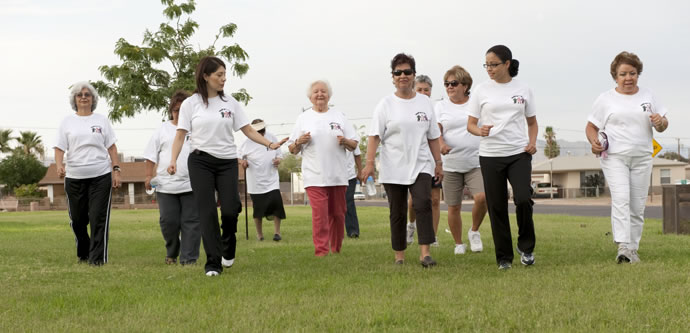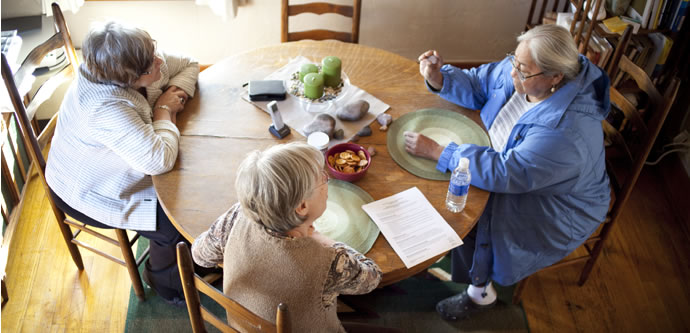FACULTY DEVELOPMENT

Hartford Geriatric Nursing Initiative: Building Academic Geriatric Nursing Capacity
2000-present The Hartford Foundation embarked on a more comprehensive strategy to support geriatric nursing faculty development, curriculum enhancement, research and practice. The Building Academic Geriatric Nursing Capacity (BAGNC) program, originally administered by the American Academy of Nursing, received grants totaling $53.2 million to address the critical shortage of leaders in geriatric nursing research and education.
BAGNC has two main components:
- Grants were provided to establish nine Centers of Geriatric Nursing Excellence (CGNEs) at schools of nursing. The Centers raise the profile of gerontological nursing at institutions, regionally and nationally, and dramatically increase recruitment to geriatric nursing, bolster research and spearhead best practices for nursing care of older adults.
- A Scholar and Fellow Awards Program provides stipends for pre-doctoral scholars and post-doctoral fellows to pursue careers in academic geriatrics and nursing administration focused on the research and care needs of elderly patients.
The CGNEs have graduated over 50 doctorally trained geriatric nursing faculty, and retrained over 200 faculty with geriatrics expertise. The Donald W. Reynolds Foundation also funded a CGNE modeled after the Hartford Centers at the University of Oklahoma.
The 251 Patricia G. Archbold Scholars and Claire M. Fagin Fellows have taught over 33,000 undergraduate, graduate, and doctoral students, received over $80 million in funding from the NIH and other sources, and published over 1,400 articles on the care of older adults. The program has attracted other funders, including The Atlantic Philanthropies, the Mayday Fund, the American Heart Association, and the Jonas Center for Nursing Excellence.
Gerontological nurses apply a body of specialized knowledge and skills to provide nursing care that meets the unique needs of older adults. They are able to detect problems early and initiate care that often prevents more serious conditions or minimizes their effects. Patricia G. Archbold, DNSc, RNFormer Director
Building Academic Geriatric Nursing Capacity Initiative (Top ) Lisa Skemp, PhD, RN, a Fagin Fellow (2003-2005) visits an older woman in rural Iowa to assess her needs.
(Below) Participants of a walking program in Phoenix, AZ, to promote cardiovascular health among older Hispanic women developed by Adriana Perez, PhD, RN, an Archbold Scholar (2007-2009) and Fagin Fellow (2990-2011).
 The impetus behind the BAGNC Alumni Association was an opportunity to give back to the Hartford Foundation and the BAGNC program for the commitment and confidence theyve placed in us as nurses. Our goal is to support each other in our scholarship and practice and to share resources and expertise.
Adriana Perez, PhD, RN, ANP
The impetus behind the BAGNC Alumni Association was an opportunity to give back to the Hartford Foundation and the BAGNC program for the commitment and confidence theyve placed in us as nurses. Our goal is to support each other in our scholarship and practice and to share resources and expertise.
Adriana Perez, PhD, RN, ANPAssistant Professor and Southwest Borderlands Scholar
Co-Director
Hartford Center of Geriatric Nursing Excellence
Arizona State University I wanted to capture students at the very beginning of their careers and get them excited about taking careof older adults and teach them best practices. Melissa B. Aselage, MSN, RN, FNP-BC
Assistant Professor
School of Nursing
Duke University
 (Above, left ) Fagin Fellow Tara Sharpp, PhD, RN, (far left) discusses her research on how staff monitor and provide health care to residents with dementia in assisted living facilities with her mentors at the Betty Irene Moore School of Nursing (left to right: Dean Heather Young, PhD, RN, Debra Bakerjian, PhD, FNP, RN, and Elena Siegel, PhD, RN).
(Above, left ) Fagin Fellow Tara Sharpp, PhD, RN, (far left) discusses her research on how staff monitor and provide health care to residents with dementia in assisted living facilities with her mentors at the Betty Irene Moore School of Nursing (left to right: Dean Heather Young, PhD, RN, Debra Bakerjian, PhD, FNP, RN, and Elena Siegel, PhD, RN).
(Above, right ) Melissa B. Aselage, PhD, RN-BC, an Archbold Scholar (20092011), now on faculty at Duke University School of Nursing.
(Below) Patricia Holkup, PhD, RN, a Fagin Fellow (2005-2007) and Dr. Gyda Swaney, co-investigator on their Historical Trauma and Unresolved Grief project, interview a project participant from a Tribal community in rural Montana.

